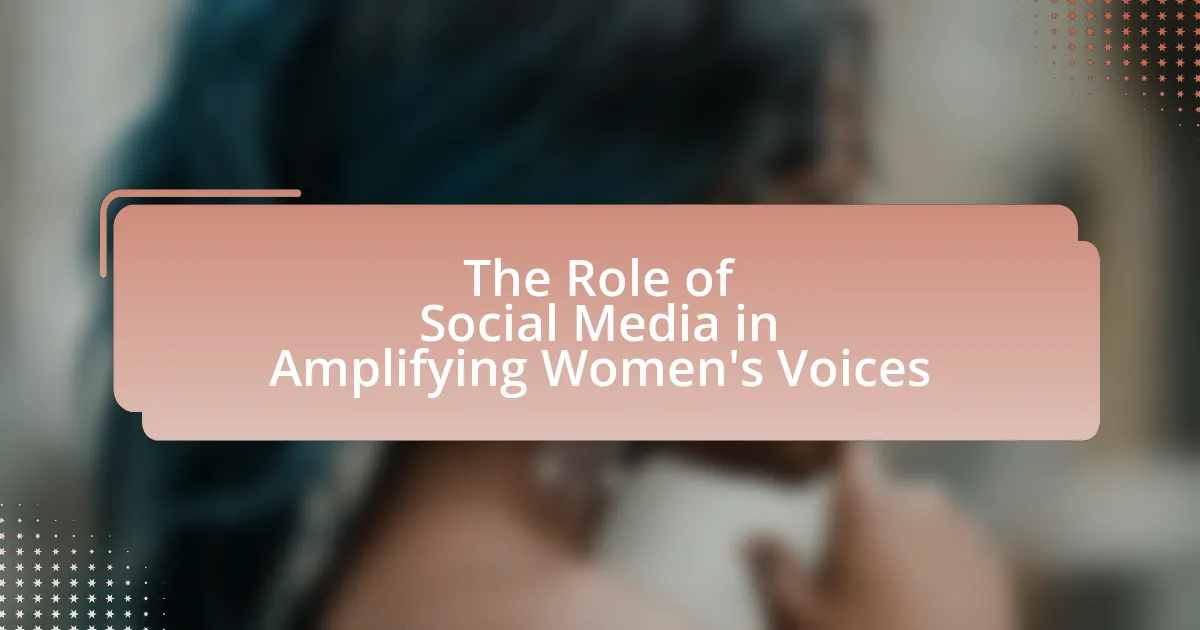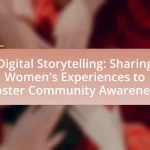The article examines the significant role of social media in amplifying women’s voices, highlighting its function as a platform for expression, community building, and activism. It discusses how movements like #MeToo and #TimesUp have gained momentum through social media, enabling women to share their experiences and advocate for gender equality. The article also explores the effectiveness of various platforms, demographic engagement, challenges women face, and successful social media campaigns that support women’s voices. Additionally, it addresses the implications for future generations and offers practical tips for women to navigate social media effectively.
What is the Role of Social Media in Amplifying Women’s Voices?
Social media plays a crucial role in amplifying women’s voices by providing a platform for expression, community building, and activism. It enables women to share their experiences, advocate for rights, and mobilize support on issues such as gender equality and violence against women. For instance, movements like #MeToo and #TimesUp gained global traction through social media, allowing millions of women to share their stories and demand accountability. Research indicates that social media can increase visibility and engagement, with a study by Pew Research Center showing that 70% of women use social media to connect with others on social issues. This demonstrates that social media not only facilitates dialogue but also empowers women to influence public discourse and policy.
How has social media transformed the landscape for women’s voices?
Social media has significantly transformed the landscape for women’s voices by providing platforms for expression, advocacy, and community building. Women can now share their experiences, mobilize for social change, and connect with like-minded individuals globally. For instance, movements like #MeToo and #TimesUp have gained traction on social media, highlighting issues of sexual harassment and gender inequality, leading to widespread awareness and action. According to a 2020 report by the Pew Research Center, 69% of women use social media to engage in political discussions, demonstrating its role in empowering women’s voices in public discourse.
What platforms are most effective in amplifying women’s voices?
Social media platforms such as Twitter, Instagram, and Facebook are most effective in amplifying women’s voices. These platforms provide a space for women to share their stories, engage in discussions, and mobilize support for various causes. For instance, Twitter has been instrumental in movements like #MeToo, allowing women to share experiences of harassment and abuse, which garnered global attention and solidarity. Instagram’s visual storytelling capabilities enable women to express themselves creatively and connect with wider audiences, while Facebook groups foster community and support networks. Research indicates that social media engagement significantly increases visibility and advocacy for women’s issues, demonstrating the platforms’ effectiveness in amplifying their voices.
How do different demographics engage with women’s voices on social media?
Different demographics engage with women’s voices on social media through varying levels of interaction, support, and amplification. For instance, younger audiences, particularly those aged 18-29, are more likely to actively share and comment on content related to women’s issues, as evidenced by a Pew Research Center study showing that 71% of this age group uses social media to express their views. In contrast, older demographics, such as those aged 50 and above, tend to engage less frequently, often consuming content rather than participating in discussions. Additionally, women are generally more supportive of women’s voices on social media, with studies indicating that female users are more likely to follow and engage with female influencers and activists. This engagement varies by cultural background, with minority groups often using social media as a platform for advocacy and community building, thereby amplifying women’s voices within their communities.
Why is amplifying women’s voices important in today’s society?
Amplifying women’s voices is crucial in today’s society because it promotes gender equality and fosters diverse perspectives in decision-making processes. When women’s voices are amplified, it leads to increased representation in various sectors, including politics, business, and media, which is essential for creating policies and practices that reflect the needs of the entire population. Research indicates that companies with diverse leadership teams are 33% more likely to outperform their peers in profitability, highlighting the economic benefits of inclusive representation. Furthermore, social media platforms have become vital tools for women to share their experiences and advocate for their rights, enabling movements like #MeToo and #TimesUp to gain global traction and influence societal change.
What historical context supports the need for women’s voices to be amplified?
The historical context supporting the need for women’s voices to be amplified includes centuries of systemic oppression and marginalization in various societies. For instance, women were largely excluded from political, social, and economic spheres, as evidenced by the lack of voting rights in many countries until the 20th century; in the United States, women gained the right to vote in 1920 with the 19th Amendment. Additionally, movements such as the suffragette movement in the early 1900s highlighted the demand for women’s rights and representation. The civil rights movement further emphasized the intersectionality of gender and race, showcasing how women’s voices were often sidelined even within broader social justice efforts. These historical injustices underline the necessity for contemporary platforms, particularly social media, to amplify women’s voices, ensuring they are heard and valued in discussions that affect their lives and communities.
How does the amplification of women’s voices contribute to social change?
The amplification of women’s voices contributes to social change by increasing visibility and awareness of gender-related issues. When women’s perspectives are shared widely, they challenge existing norms and inspire collective action, as seen in movements like #MeToo, which highlighted sexual harassment and assault, leading to policy changes and greater accountability. Research indicates that social media platforms have played a crucial role in this amplification, enabling women to connect, organize, and mobilize support on a global scale, thereby fostering a more inclusive dialogue around social justice and equality.
What challenges do women face in being heard on social media?
Women face significant challenges in being heard on social media, primarily due to systemic biases, harassment, and algorithmic discrimination. Research indicates that women often encounter online harassment at higher rates than men, which can discourage them from expressing their opinions. A study by the Pew Research Center found that 41% of women have experienced online harassment, compared to 37% of men, leading to a chilling effect on their participation. Additionally, social media algorithms tend to favor content that generates engagement, often sidelining women’s voices in favor of more sensational or controversial posts. This combination of harassment and algorithmic bias creates an environment where women’s contributions are frequently marginalized, impacting their visibility and influence on these platforms.
What types of online harassment do women encounter?
Women encounter various types of online harassment, including cyberstalking, doxxing, trolling, and sexual harassment. Cyberstalking involves persistent and unwanted attention, often leading to fear for personal safety. Doxxing refers to the malicious act of publicly revealing private information, which can lead to further harassment or threats. Trolling typically includes inflammatory comments aimed at provoking emotional responses, while sexual harassment encompasses unwanted sexual advances or explicit content shared online. According to a 2021 report by the Pew Research Center, 41% of women have experienced some form of online harassment, highlighting the prevalence and seriousness of these issues.
How do algorithms impact the visibility of women’s voices?
Algorithms significantly impact the visibility of women’s voices by determining which content is prioritized and shown to users on social media platforms. These algorithms often favor engagement metrics, which can lead to the amplification of certain voices while marginalizing others, particularly those of women and minority groups. For instance, a study by the Pew Research Center found that women are often underrepresented in online discussions, with algorithms favoring content that aligns with existing popular narratives, which can perpetuate gender biases. Additionally, research published in the journal “Social Media + Society” indicates that algorithmic biases can result in women’s contributions being less visible, as their posts may receive lower engagement compared to male counterparts, further diminishing their presence in digital spaces.
How do social media campaigns support women’s voices?
Social media campaigns support women’s voices by providing a platform for expression, advocacy, and community building. These campaigns enable women to share their stories, raise awareness about issues affecting them, and mobilize support for social change. For instance, movements like #MeToo and #TimesUp have utilized social media to amplify women’s experiences with harassment and discrimination, leading to significant cultural conversations and policy changes. Research indicates that social media can increase visibility for women’s issues, with studies showing that campaigns can reach millions of users, fostering solidarity and encouraging collective action.
What are some successful social media campaigns that have amplified women’s voices?
Successful social media campaigns that have amplified women’s voices include the #MeToo movement, which gained traction in 2017, allowing survivors of sexual harassment and assault to share their stories and seek justice. This campaign led to widespread awareness and discussions about sexual violence, resulting in policy changes and increased support for victims. Another notable campaign is #TimesUp, launched in 2018, which focuses on combating workplace harassment and advocating for gender equality in various industries. This initiative has raised millions for legal defense funds to support women facing harassment. Additionally, the #SheInspiresMe campaign, initiated by the UN Women, highlights stories of women who inspire others, fostering a global dialogue on women’s empowerment and achievements. These campaigns have effectively utilized social media platforms to create communities, raise awareness, and drive social change.
What strategies were employed in these campaigns?
Campaigns aimed at amplifying women’s voices on social media employed strategies such as targeted messaging, community engagement, and influencer partnerships. Targeted messaging involved crafting specific narratives that resonate with women’s experiences, thereby fostering a sense of connection and empowerment. Community engagement strategies included creating safe spaces for dialogue and support, which encouraged participation and sharing of personal stories. Influencer partnerships leveraged the reach of prominent figures to amplify messages and increase visibility, effectively mobilizing larger audiences. These strategies have been validated by studies showing increased engagement and awareness around women’s issues through social media platforms.
How did these campaigns engage their audiences effectively?
These campaigns engaged their audiences effectively by utilizing targeted messaging and interactive content that resonated with their specific demographics. For instance, campaigns often employed storytelling techniques that highlighted personal experiences, fostering emotional connections and encouraging audience participation. Additionally, the use of hashtags and challenges on platforms like Instagram and Twitter created a sense of community and collective action, driving higher engagement rates. Research indicates that campaigns leveraging user-generated content saw a 28% increase in audience interaction, demonstrating the effectiveness of involving the audience in the narrative.
How can organizations leverage social media to support women’s voices?
Organizations can leverage social media to support women’s voices by creating platforms for dialogue, sharing impactful stories, and amplifying underrepresented perspectives. By utilizing hashtags like #MeToo and #TimesUp, organizations can engage in conversations that highlight women’s issues and foster community support. Research indicates that social media campaigns can increase awareness and mobilize action; for instance, a study by the Pew Research Center found that 70% of women believe social media is a powerful tool for raising awareness about gender equality. Additionally, organizations can collaborate with influencers and advocates to reach wider audiences, ensuring that women’s voices are not only heard but also valued in public discourse.
What best practices should organizations follow when creating content for women?
Organizations should prioritize authenticity and inclusivity when creating content for women. Authenticity involves representing women’s diverse experiences and perspectives accurately, which fosters trust and engagement. Inclusivity means ensuring that content resonates with women from various backgrounds, including different races, ages, and socioeconomic statuses. Research indicates that 70% of women feel more connected to brands that reflect their values and experiences, highlighting the importance of relatable content. Additionally, organizations should utilize platforms where women are most active, such as Instagram and Pinterest, to maximize reach and impact. By focusing on these best practices, organizations can effectively amplify women’s voices and create meaningful connections.
How can partnerships enhance the reach of women’s voices on social media?
Partnerships can enhance the reach of women’s voices on social media by leveraging combined audiences and resources. When organizations or influencers collaborate, they can share content across multiple platforms, increasing visibility and engagement. For instance, a study by the Pew Research Center found that social media campaigns involving partnerships can lead to a 50% increase in audience reach compared to solo efforts. This collaborative approach not only amplifies messages but also fosters a sense of community, encouraging more women to participate in discussions and share their experiences.
What role do influencers play in amplifying women’s voices on social media?
Influencers play a crucial role in amplifying women’s voices on social media by leveraging their platforms to promote gender equality and highlight women’s issues. They create content that resonates with diverse audiences, often sharing personal stories, advocating for women’s rights, and supporting female-led initiatives. For instance, a study by the Pew Research Center found that 70% of young women feel more empowered when they see relatable content from influencers, which underscores the impact of influencers in shaping perceptions and encouraging dialogue around women’s experiences.
How do influencers impact the perception of women’s issues?
Influencers significantly shape the perception of women’s issues by leveraging their platforms to raise awareness and foster discussions. They often highlight topics such as gender equality, body positivity, and reproductive rights, which can lead to increased visibility and understanding among their followers. For instance, a study by the Pew Research Center found that 69% of social media users believe that influencers can effectively raise awareness about social issues, including those affecting women. This engagement can challenge stereotypes and promote advocacy, ultimately influencing public opinion and policy discussions surrounding women’s rights.
What criteria should be considered when selecting influencers for women’s advocacy?
When selecting influencers for women’s advocacy, it is essential to consider their alignment with the values of the movement, audience engagement, and authenticity. Influencers should demonstrate a commitment to women’s issues, as evidenced by their past advocacy work or content that promotes gender equality. Audience engagement metrics, such as likes, shares, and comments, indicate the influencer’s ability to connect with their followers, which is crucial for amplifying messages effectively. Authenticity is vital; influencers who share personal stories or experiences related to women’s issues tend to resonate more with audiences, fostering trust and encouraging action. These criteria ensure that the selected influencers can genuinely contribute to the advocacy efforts and mobilize support for women’s rights.
How can influencers effectively communicate women’s stories?
Influencers can effectively communicate women’s stories by utilizing authentic narratives that resonate with their audience. By sharing personal experiences, testimonials, and diverse perspectives, influencers create relatable content that highlights the complexities of women’s lives. Research indicates that storytelling fosters emotional connections; for instance, a study published in the Journal of Marketing Research found that narratives can increase engagement and empathy among audiences. Additionally, influencers can leverage platforms like Instagram and TikTok to visually represent these stories, making them more accessible and impactful. By prioritizing inclusivity and representation, influencers can amplify underrepresented voices, ensuring that women’s stories are heard and valued in the digital space.
What are the implications of social media for future generations of women?
Social media significantly influences future generations of women by providing platforms for self-expression, activism, and community building. These platforms enable women to share their experiences, advocate for gender equality, and mobilize support for social issues, as evidenced by movements like #MeToo and #TimesUp, which gained momentum through social media channels. Furthermore, research from the Pew Research Center indicates that 70% of young women feel empowered to express their opinions online, highlighting the role of social media in fostering confidence and leadership among women. This empowerment can lead to increased participation in public discourse and decision-making processes, shaping a more equitable society for future generations.
How can young women be empowered to use social media for their voices?
Young women can be empowered to use social media for their voices by providing them with education on digital literacy and online safety. This education enables them to navigate social media platforms effectively, understand the implications of their online presence, and engage in meaningful conversations. Research indicates that programs focusing on digital skills can increase confidence and participation among young women, as seen in initiatives like the Girls Who Code program, which has successfully encouraged young women to express themselves in tech and social media spaces. Additionally, mentorship from female role models in various fields can inspire young women to share their stories and advocate for issues they care about, further amplifying their voices in the digital landscape.
What skills are necessary for women to navigate social media effectively?
Women need digital literacy, critical thinking, and effective communication skills to navigate social media effectively. Digital literacy enables women to understand and utilize various platforms, ensuring they can engage with content and audiences appropriately. Critical thinking allows them to evaluate information, discern credible sources, and avoid misinformation, which is crucial in an environment rife with false narratives. Effective communication skills help women articulate their thoughts clearly and engage meaningfully with their audience, fostering connections and amplifying their voices. These skills collectively empower women to leverage social media as a tool for advocacy and expression.
What practical tips can women use to amplify their voices on social media?
Women can amplify their voices on social media by consistently sharing authentic content that resonates with their audience. Engaging storytelling, personal experiences, and relatable insights can foster connections and encourage dialogue. Utilizing hashtags strategically can increase visibility; for example, campaigns like #MeToo and #TimesUp have successfully raised awareness on critical issues. Collaborating with other women and influencers can also expand reach and create a supportive network. According to a study by the Pew Research Center, women are more likely to use social media for activism, highlighting the platform’s potential for collective impact.


